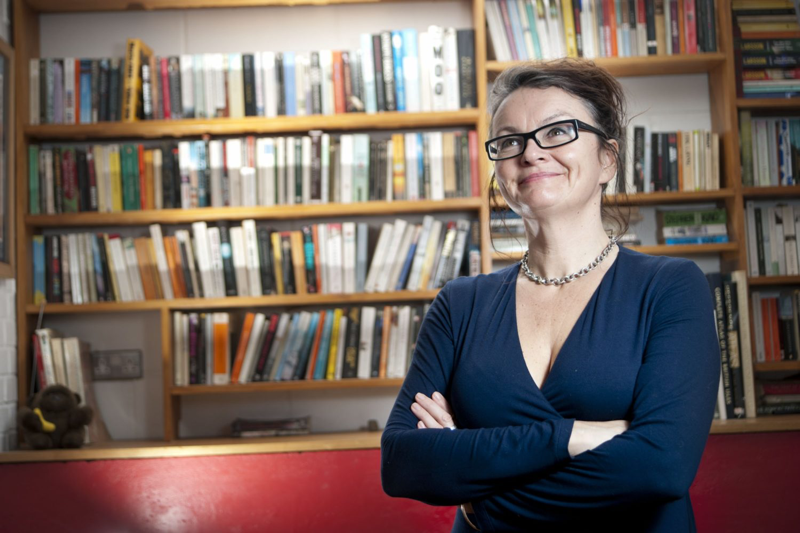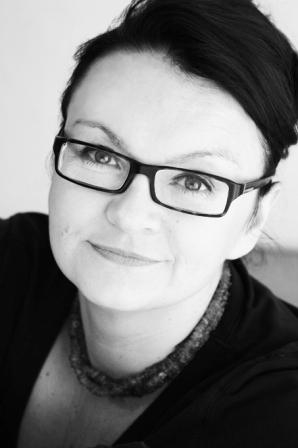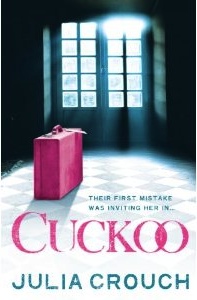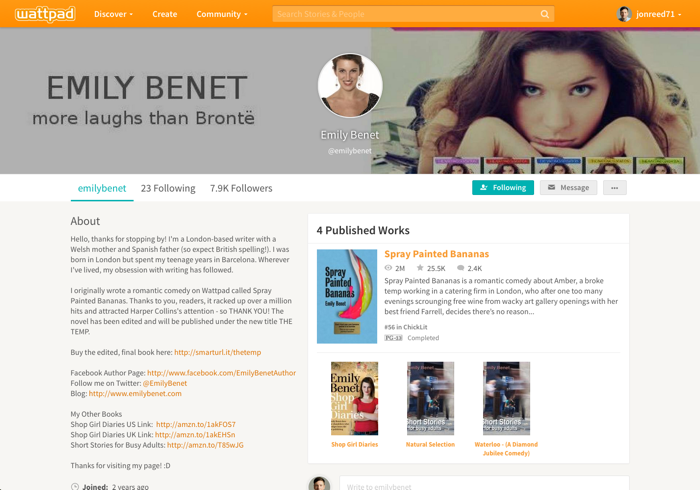How #NaNoWriMo helped Julia Crouch win a three-book deal with Headline

Is it possible to write a novel in a month? Julia Crouch tells Danuta Kean how she used #NaNoWriMo to do just that – and secure a three-book deal with Headline.
 Writers’ block: two words that strike fear into every writer. But for the past 11 years every November a website has come to the rescue. National Novel Writing Month was founded in 1999 by US-based freelance Chris Baty and 20 other writers. Aimed simply at getting words on the page, it sets participants a target of 50,000 words written by the end of the month, and provides forums and exercises aimed at overcoming writer’s block. It has an impressive success rate: of the 165,000 participants in 2009, over 30,000 crossed the 50,000 word line at the end of November.
Writers’ block: two words that strike fear into every writer. But for the past 11 years every November a website has come to the rescue. National Novel Writing Month was founded in 1999 by US-based freelance Chris Baty and 20 other writers. Aimed simply at getting words on the page, it sets participants a target of 50,000 words written by the end of the month, and provides forums and exercises aimed at overcoming writer’s block. It has an impressive success rate: of the 165,000 participants in 2009, over 30,000 crossed the 50,000 word line at the end of November.
One of those who participated in 2008 was creative writing graduate Julia Crouch, who had hit a wall. It helped more than she expected: before Christmas the books that came out of NaNoWriMo won her a three book deal with Headline. Her début, the psychological thriller Cuckoo, published in March 2011. Here she explains how NaNoWriMo helped.
Why did you use NaNoWriMo to write Cuckoo?
It was my second NaNovel – I wrote it in November 2008. In 2007, I had just finished the Open University Creative writing course. The idea of writing a novel-length piece seemed terrifying – it would require at least a year’s commitment and I didn’t even know that I could manage. Also, like many fledgling writers, I had several novels that I started but never got beyond chapter three, simply because of a general sense of despair at my uselessness.
At OU my tutor, John O’ Donoghue suggested NaNoWriMo. I loved the idea of immersing yourself so completely in something. But it also seemed like a very economical way of discovering whether I could or I couldn’t do that long, sustained story thing.
How did the website help?
The whole ethos of sending your internal editors away for November was incredibly useful – no more despair, just the necessity to keep going, spurred on by a frequently crashing website full of wonderful communities, motivational exercises and inspirational stories.
I have learned with the three first draft novels I have now written that I have to write quick, dirty and fast. If a new story thread comes up that I have not prepared for, or a character develops a new trait that was unforeseen, I just roll with it and put a little note in Scrivener that I need to lay the tracks for it.
Did you have a plan or did you just write what came into your head?
 With all of my novels, I have what a tutor of mine, the late Stewart Browne, called ‘a generative image’ – a kernel of an idea, a dilemma, a sense of a place, some music, a smell. It’s pretty synaesthetic… With Cuckoo, it was Nick Cave’s album, The Boatman’s Call, which is an extraordinary collection of songs written during his love affair with PJ Harvey. I thought: ‘What would happen if your best friend came to stay and she turned your Steady Eddie husband into the Nick Cave that wrote those songs?’ Other inputs were a friend’s story of the punishing two years she and her partner spent rebuilding a beautiful old wreck in the country, and Simone de Beauvoir’s She Came to Stay.
With all of my novels, I have what a tutor of mine, the late Stewart Browne, called ‘a generative image’ – a kernel of an idea, a dilemma, a sense of a place, some music, a smell. It’s pretty synaesthetic… With Cuckoo, it was Nick Cave’s album, The Boatman’s Call, which is an extraordinary collection of songs written during his love affair with PJ Harvey. I thought: ‘What would happen if your best friend came to stay and she turned your Steady Eddie husband into the Nick Cave that wrote those songs?’ Other inputs were a friend’s story of the punishing two years she and her partner spent rebuilding a beautiful old wreck in the country, and Simone de Beauvoir’s She Came to Stay.
On good days I let the movie play in my head and write down what I see. I have a sense of where I am going with the whole story, and each day as I sit down, I try to decide where I want things to go in the scene I am writing. The slightly spooky thing is that quite often my characters won’t let me do what I want to do. I have a dialogue with them, tell them they can’t do that, and go ‘just watch me.’
How much of what you wrote with NaNoWriMo were you happy with?
The exercise is about getting the words down on the page. On the first read through I cringed a lot. But there were other bits I felt surprisingly hopeful about. I have recently revisited the printout of the first draft of Cuckoo and it is barely visible through the scrawlings and crossings out. But some paragraphs have remained the same throughout – but not necessarily in the same place. I went through it all with a fresh eye, interrogating first of all my story – there was a lot that needed to be added, quite a bit to be removed, and a good bit of moving around to do. I looked at character and back-story, too, cut out all the awful adverbs and overwriting. You have to allow yourself to get carried away in the first draft, but then you need to rein yourself in.
Facts then needed to be researched, otherwise I’d waste hours trawling the internet. When you’ve written it down, then you can see if what you have written is right. A bit in Cuckoo featuring a hospital and baby drew on my own experience of my youngest son being very sick at 10 weeks old, but I also have several doctor, midwife, social worker and ambulance driver friends, who helped by reading through those passages.
Also, the length went up from 50,000 words to 120,000 words (it has since lost another 8,000 words). The second draft took me until November 2009 to complete. I sent the agent Simon Trewin at United Agents the first 10,000 words and a synopsis. He asked for the whole thing and then to change the ending slightly. Then he signed me. He sold it to Headline, just like that. In short, it has been a long, but incredibly exhilarating journey.
For me, the most surprising outcome is that I discovered I could write at length. And now it is my living. And I am inordinately grateful to NaNoWriMo for helping me find that out.
Were there any surprising outcomes from using NaNoWriMo?
There is nothing like its focussed, online community. If you have a question – for my first novel, I wanted to know a good restaurant in New York, where a very rich couple might dine on a regular evening meal – you can just ask a local group for the answer. Or if you can’t imagine, for example, how two women with no equipment might get over a 15ft high electrified razor wire fence, you can ask and people come up with the most extraordinary suggestions. Local meet ups were good, too – we were an odd assortment of strange obsessives, but we all had this one thing in common, and we understood.
But for me, the most surprising outcome is that I discovered I could write at length. And now it is my living. And I am inordinately grateful to NaNoWriMo for helping me find that out.
For Julia Crouch’s latest novel, see her website.


Pingback: New & Exciting Writerly Things. « Books and Bowel Movements
What you say makes so much sense, and I think I’ll take the NaNo challenge sometime soon (perhaps when my first year of MA has finished). It took me 6 years to write my first book, and six months to write my second (obviously, it then had to be seriously trawled over and culled considerably). Thanks for your story, which is an inspiration to us all. And I plan to read Cuckoo when it comes out.
What do you think of websites like ‘authonomy’? I know two people who’ve had books published from it (I follow one, Rohit Gore, a young and very talented Indian writer) but it was such a game getting your book ranked, and without ‘networking’ skills, you were pretty much doomed.
This echoes my experience of #nanowrimo nicely (with the exception of the subsequent book deal). I’ve just completed my first NaNoWriMo this November just gone and am getting stuck into the rewriting process now. I started out with only a scenario and a character list and finished with 50,000 of something tangible to work with. Going into it knowing a lot of what you write will be nonsense and will require changing is actually quite liberating, which took me by surprise. As a creative process it’s a fascinating thing to do (especially with a full time job on the side) – the words and ideas just poured out.
Well done to Julia for her publishing deal! Now I must get back to my redraft…